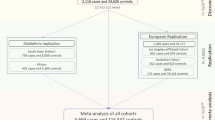Abstract
Structurally and functionally, the human cornea is a highly specialized tissue. The corneal stromal collagen matrix is uniquely transparent and yet maintains a mechanically tough and chemically impermeable barrier between the eye and environment. We report for the first time that stromal keratocytes of the human cornea show cytogenetic abnormalities with a frequency that is unprecedented among normal tissues. The abnormalities are acquired, clonal and nonclonal, primarily aneuploid in nature, and present in normal as well as diseased corneas.
Similar content being viewed by others
Author information
Authors and Affiliations
Additional information
Received: 10 February 1997 / Accepted: 21 May 1997
Rights and permissions
About this article
Cite this article
Pettenati, M., Sweatt, A., Lantz, P. et al. The human cornea has a high incidence of acquired chromosome abnormalities. Hum Genet 101, 26–29 (1997). https://doi.org/10.1007/s004390050580
Issue Date:
DOI: https://doi.org/10.1007/s004390050580




